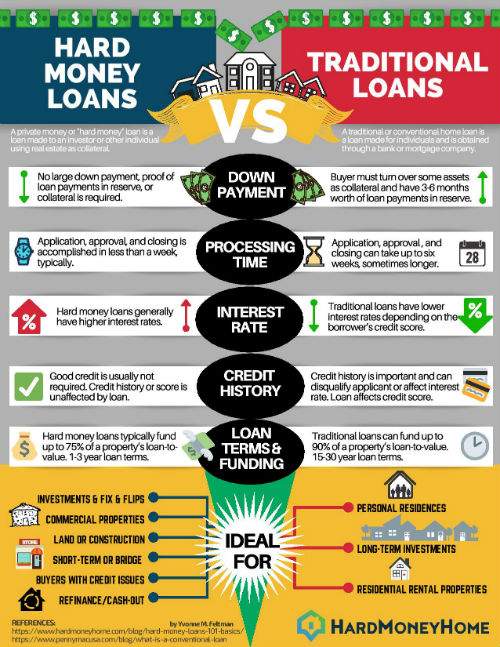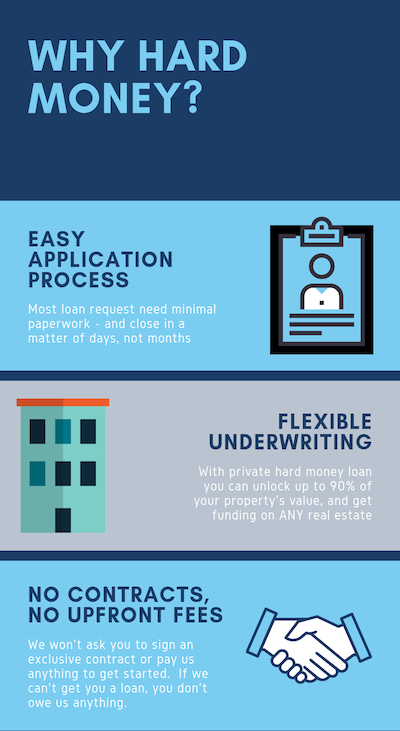If you have experienced a foreclosure in the past, you may be wondering if it is still possible to obtain a hard money loan. While a history of foreclosure can certainly make it more challenging to secure traditional financing, hard money lenders take a different approach. In this article, we will explore whether individuals with a foreclosure history can still qualify for hard money loans and discuss the factors that lenders consider in making their lending decisions. By examining these key components, you will gain a better understanding of the possibilities available to you.

What is a hard money loan?
A hard money loan is a type of financing that is typically used by real estate investors or individuals who are unable to obtain financing from traditional lenders such as banks or credit unions. These loans are backed by the value of the property being purchased rather than the borrower’s creditworthiness or income.
Definition
A hard money loan, also known as a private money loan, is a short-term loan that is typically secured by real estate. Unlike traditional loans, which rely heavily on a borrower’s credit score and income, hard money lenders focus primarily on the value of the property being purchased or used as collateral. These loans are usually provided by private investors or companies that specialize in hard money lending.
How it works
When applying for a hard money loan, the borrower must provide information about the property they wish to purchase or use as collateral. The lender will then evaluate the property’s value and determine the loan amount based on a percentage of the property’s appraised value, called the loan-to-value (LTV) ratio. Typically, hard money loans have an LTV ratio of around 60 to 70%.
Once approved, the borrower receives the loan funds, usually within a few weeks, and begins making interest-only payments during the loan term. The term of a hard money loan is typically short, ranging from a few months to a few years. At the end of the term, the borrower must repay the entire loan amount, either through the sale of the property or by refinancing with a different type of loan.
Advantages and disadvantages
One of the main advantages of hard money loans is that they provide quick access to funding, which can be beneficial for real estate investors who need to act fast to secure a property. Additionally, hard money lenders are more flexible and willing to work with borrowers who may not meet the strict criteria of traditional lenders.
However, hard money loans also come with several disadvantages. The interest rates on these loans are typically higher than those of traditional loans, which can result in higher monthly payments. Additionally, the short-term nature of hard money loans means that borrowers may need to find alternative financing options to repay the loan at the end of the term. Lastly, the property being used as collateral is at risk of foreclosure if the borrower fails to make timely payments.
Understanding foreclosure
Definition
Foreclosure is a legal process through which a lender takes possession of a property due to the borrower’s failure to repay the loan. This process allows the lender to sell the property to recoup the outstanding debt.
Causes of foreclosure
Foreclosure can occur for various reasons, including financial hardships, job loss, unexpected medical expenses, or simply mismanagement of finances. In some cases, borrowers may fall behind on their mortgage payments and struggle to catch up, leading to foreclosure proceedings.
Effects on credit history
Foreclosure has a significant negative impact on a borrower’s credit history. It can lower the borrower’s credit score by several hundred points, making it difficult to obtain financing in the future. Additionally, foreclosure remains on a borrower’s credit report for up to seven years, making it challenging to establish good credit during that time.
Impact of foreclosure on eligibility for hard money loans
Traditional lenders vs. hard money lenders
When it comes to eligibility for financing, traditional lenders such as banks and credit unions tend to have strict criteria that focus heavily on a borrower’s creditworthiness and income stability. In contrast, hard money lenders are often more concerned with the value of the property being used as collateral.
Foreclosure can severely affect a borrower’s eligibility for traditional loans, as banks and credit unions are generally hesitant to lend to individuals with a history of foreclosure. However, hard money lenders may be more willing to work with borrowers who have experienced foreclosure, as long as the property being used as collateral has sufficient value.
Underwriting criteria for hard money loans
While hard money lenders may be more flexible, they still have their own underwriting criteria to assess a borrower’s eligibility. These criteria typically include the loan-to-value ratio, the borrower’s exit strategy, the property’s location and condition, and the borrower’s ability to make interest payments.
When considering a borrower with a history of foreclosure, hard money lenders will assess whether the borrower has made efforts to rebuild their credit and stabilize their financial situation. Additionally, the lender will evaluate the property’s value and marketability to ensure that it can be sold if the borrower defaults on the loan.
Considerations for lenders
Lenders that specialize in hard money loans must carefully consider the risks associated with lending to borrowers with a history of foreclosure. They must assess the borrower’s financial situation, credit improvement efforts, and the marketability of the property being used as collateral. Additionally, they must determine the appropriate interest rate and loan term that reflects the level of risk involved.
Lenders should also evaluate the borrower’s exit strategy, as it demonstrates their ability to repay the loan in a timely manner. A well-considered and realistic exit strategy can provide lenders with confidence in the borrower’s ability to succeed with the loan.
Factors to consider before applying for a hard money loan
Current financial situation
Before applying for a hard money loan, it is essential to assess your current financial situation. This includes evaluating your income, expenses, and debt. Understanding your financial standing will help determine whether you can afford the loan payments and if a hard money loan is the right financing option for you.
Reason for loan
Another factor to consider is the reason for seeking a hard money loan. Whether you are using the loan to purchase an investment property, finance a renovation project, or consolidate debt, understanding your specific needs and goals will help you make an informed decision.
Exit strategy
Having a well-thought-out exit strategy is crucial when applying for a hard money loan. An exit strategy outlines how and when you plan to repay the loan. For example, if you are using the loan to purchase an investment property, your exit strategy may involve selling the property within a certain timeframe or refinancing with a traditional loan once the property’s value has increased.
Property value and location
Hard money lenders primarily focus on the value and location of the property being used as collateral. Before applying for a hard money loan, it is important to conduct a thorough evaluation of the property. This includes obtaining an appraisal to determine its current market value and assessing its location’s desirability and potential for appreciation.

Steps to improve eligibility for a hard money loan
Rebuilding credit
If you have a history of foreclosure, one of the most important steps you can take to improve your eligibility for a hard money loan is to rebuild your credit. This can be achieved by making timely payments on all debts, reducing your overall debt load, and addressing any negative marks on your credit report. Over time, as your credit improves, hard money lenders may be more willing to work with you.
Demonstrating stable income
Another crucial factor in improving your eligibility is demonstrating stable and reliable income. Hard money lenders want to ensure that you have the means to make timely interest payments. Providing documentation of your income, such as pay stubs or tax returns, can help establish your income stability and make you a more attractive borrower.
Building a strong property portfolio
If you have a history of foreclosure, building a strong property portfolio can help improve your eligibility for a hard money loan. By acquiring and successfully managing properties, you demonstrate your ability to generate income and protect the lender’s investment. A robust property portfolio can increase lenders’ confidence in your ability to repay the loan.
Finding hard money lenders willing to work with borrowers with foreclosure history
Researching lenders
When seeking a hard money loan after experiencing foreclosure, it is important to research lenders that are willing to work with borrowers in similar situations. Not all hard money lenders have the same criteria, so it is crucial to find ones that consider borrowers with a history of foreclosure. Online research, industry publications, and networking with real estate professionals can help you identify these lenders.
Building relationships with lenders
Building relationships with hard money lenders is beneficial when seeking financing, especially after foreclosure. By establishing open lines of communication and demonstrating your commitment to rebuilding your financial situation, lenders may be more willing to work with you. Attend real estate conferences, join networking groups, and engage with lenders to create relationships based on trust and mutual understanding.
Exploring alternative lending options
If traditional hard money lenders are hesitant to work with borrowers with a history of foreclosure, exploring alternative lending options may be necessary. Private investors, crowdfunding platforms, or specialized lending companies may be more open to financing individuals with a foreclosure history. However, it is crucial to thoroughly research these alternative options and carefully read the loan terms to ensure they align with your goals and financial situation.

Tips for a successful hard money loan application
Preparing a comprehensive loan proposal
To increase your chances of success when applying for a hard money loan, it is essential to prepare a comprehensive loan proposal. This includes providing detailed information about the property, including its market value, location, and potential for appreciation. Additionally, the proposal should outline your exit strategy, your financial stability, and your plan to repay the loan.
Providing documentation of income, assets, and property
When applying for a hard money loan, it is crucial to provide documentation of your income, assets, and the property being used as collateral. This may include bank statements, tax returns, pay stubs, property appraisals, and any other relevant documentation. The more information you can provide to the lender, the easier it will be for them to assess your eligibility.
Presenting a solid exit strategy
A key component of a successful hard money loan application is presenting a solid exit strategy. This demonstrates to the lender that you have a plan to repay the loan. Whether it involves selling the property, refinancing, or using other sources of financing, your exit strategy should be well thought out and realistic.
Potential pitfalls to avoid when seeking a hard money loan after foreclosure
Unrealistic loan terms
One potential pitfall when seeking a hard money loan after foreclosure is accepting unrealistic loan terms. Some lenders may take advantage of borrowers in desperate situations by offering loans with excessive interest rates or unfavorable repayment terms. It is important to carefully review the terms of the loan and ensure they align with your financial goals and ability to repay.
Excessive fees and interest rates
Another pitfall to avoid is falling into the trap of excessive fees and interest rates. Hard money loans tend to have higher interest rates compared to traditional loans, but it is essential to ensure that these rates are within an acceptable range. Additionally, be cautious of lenders who charge excessive fees upfront, as this can significantly increase the overall cost of the loan.
Unreliable lenders
When seeking a hard money loan after foreclosure, it is crucial to be cautious of unreliable lenders. Fraudulent lending practices are unfortunately prevalent, and borrowers with a history of foreclosure can be vulnerable targets. Do thorough research, read reviews, and consult with professionals in the industry to ensure that you are working with reputable and trustworthy lenders.

Seeking professional guidance
Consulting with real estate professionals
When navigating the process of obtaining a hard money loan after foreclosure, seeking professional guidance from real estate professionals can be incredibly valuable. Real estate agents, real estate attorneys, and property appraisers can provide advice and insights that can help you make informed decisions. They can also help you identify reputable hard money lenders who are experienced in working with borrowers with a foreclosure history.
Working with experienced mortgage brokers
Mortgage brokers can also be invaluable resources when seeking a hard money loan after foreclosure. They have expertise in the lending industry and can help match borrowers with lenders who are willing to work with their specific circumstances. Mortgage brokers can also assist in preparing loan applications and negotiating favorable loan terms on your behalf.
Hiring a foreclosure specialist
If you are experiencing or have recently gone through foreclosure, hiring a foreclosure specialist can provide valuable guidance. These professionals specialize in assisting borrowers who are facing foreclosure and can help you understand your options, negotiate with lenders, and potentially avoid foreclosure in the future. Their expertise can be particularly beneficial when seeking a hard money loan.
Conclusion
Obtaining a hard money loan after experiencing foreclosure may be challenging, but it is not impossible. By understanding the underwriting criteria of hard money lenders, rebuilding your credit, demonstrating stable income, and presenting a solid loan proposal, you can improve your eligibility for financing. Additionally, researching and building relationships with lenders who are willing to work with borrowers with a foreclosure history can increase your chances of securing a hard money loan. Seeking professional guidance and being aware of potential pitfalls will also help you navigate the process successfully. With determination, careful planning, and the right resources, you can overcome a history of foreclosure and access the financing you need for your real estate endeavors.




